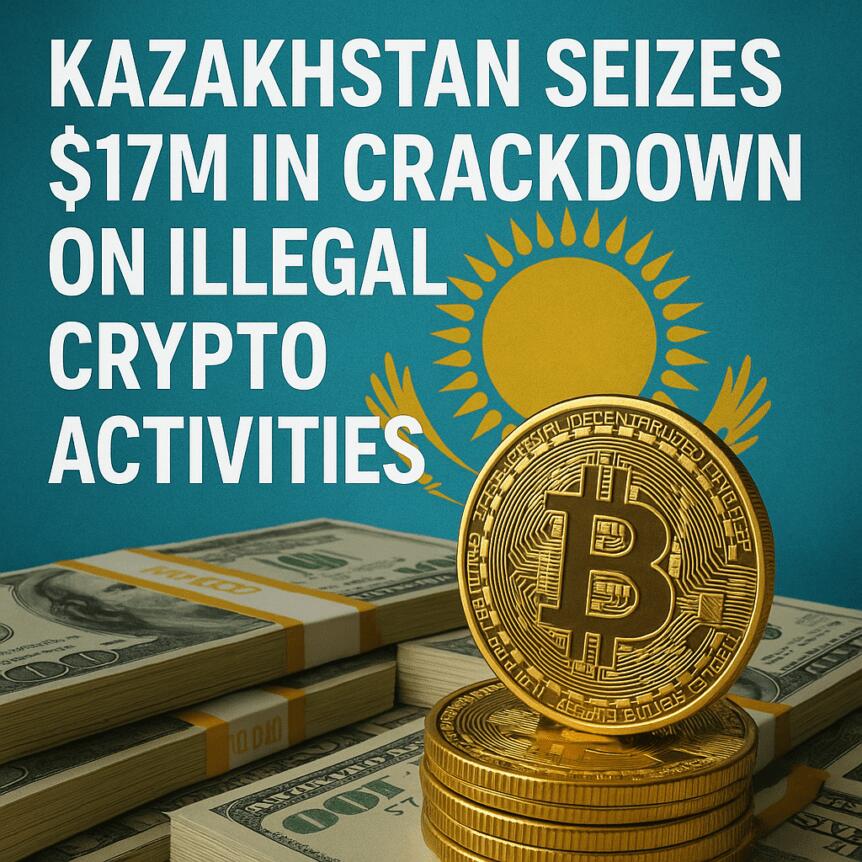Kazakhstan is rapidly strengthening its position as a burgeoning center for cryptocurrency activity in Central Asia, even as it escalates efforts to combat illicit crypto operations. Recent crackdowns have seen authorities shut down dozens of crypto platforms suspected of facilitating money laundering, with the Financial Monitoring Agency (AFM) seizing over $16.7 million in cryptocurrencies linked to illegal schemes this year alone. Alongside enforcement, Kazakhstan is implementing stricter regulations to legitimize its crypto market, signaling a nuanced approach to fostering innovation while safeguarding financial integrity.
- Kazakhstan’s AFM has shut down 130 crypto platforms involved in money laundering this year, seizing $16.7 million in crypto assets.
- The country is introducing new AML measures, requiring verification for crypto transactions exceeding 500,000 tenge ($925).
- Previously, only recipient IINs were verified; now, sender IINs will also require validation to prevent illegal transfers.
- Current crackdowns distinguish between illegal crypto exchangers and regulated centralized exchanges, with 20 platforms licensed as of now.
- Kazakhstan continues to develop its crypto infrastructure, including stablecoin payments, Bitcoin funds, and a potential state-backed crypto reserve.
Cryptocurrency Crackdowns and Regulatory Moves
Central Asian nation Kazakhstan has been intensifying efforts to root out illicit activities within its growing crypto sector. The AFM has dismantled 130 platforms this year, mainly those functioning as informal currency exchangers rather than traditional exchanges—plascing a focus on unregulated crypto trading. The seized assets, totaling over $16.7 million, reflect the government’s commitment to cracking down on money laundering and illegal crypto schemes while simultaneously promoting legitimate digital asset adoption.
Last week, authorities also confiscated $642,000 from illegal crypto mining operations, indicating a crackdown on both illicit trading and mining activities. This dual approach underscores Kazakhstan’s strategic aim of balancing regulatory rigor with industry growth, especially in the context of its aspirations to become a regional crypto hub.
Enhanced AML Regulations for Crypto Transactions
Part of Kazakhstan’s crackdown involves tighter anti-money laundering (AML) policies. Deputy chairman Kairat Bizhanov announced that transactions involving bank card top-ups exceeding 500,000 tenge ($925) will now require verification of the sender’s Individual Identification Number (IIN). Previously, only the recipient’s IIN was checked. Authorities are also exploring confirmation options via mobile apps and SMS, aiming to make transaction monitoring more robust and transparent.
[
]
These regulatory updates intend to prevent anonymous or suspicious funds from flowing freely across Kazakhstan’s crypto industry, maintaining a firm stance against money laundering while supporting the growth of legitimate blockchain projects.
Growing Industry Landscape and Regulatory Framework
Despite the recent shutdowns, Kazakhstan maintains a regulated crypto environment with 20 licensed platforms listed on the AFSA’s public register. Among these are major international exchanges like Bybit and WhiteBIT, which operate in compliance with local laws. The country’s regulatory framework aims to strike a balance—securing the integrity of its crypto markets and fostering innovation, including stablecoins, Bitcoin investments, and the development of a national crypto reserve.
In recent months, Kazakhstan has pioneered the acceptance of stablecoins such as Tether USDt and launched Central Asia’s first spot Bitcoin fund, signaling its intention to evolve into a key regional player in the digital economy. The government’s progress toward establishing a state-backed crypto reserve could further cement its position, although specifics regarding the allocation of seized illicit funds to this reserve remain unclear.
Overall, Kazakhstan’s approach reflects a strategic blend of regulatory enforcement and industry development, aiming to create a balanced environment that attracts legitimate crypto businesses while shutting down illegal operations. As the country navigates its evolving blockchain landscape, it continues to demonstrate its commitment to becoming a leading cryptocurrency hub in Central Asia.



